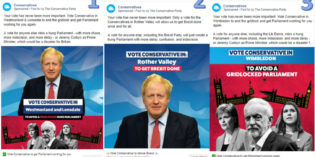Tag: Social media

Faced with an ‘infodemic’ of fake news about Covid-19, most people are checking their facts – but we mustn’t be complacent
As fake news spreads about Covid-19, early evidence suggest that most people are responding sensibly, and double-checking the information they receive. However, given trust in journalism remains low, it remains vital, argues Paul Reilly, that we all act responsibility, and verify what we read and watch.

Book Review | Are Filter Bubbles Real? by Axel Bruns
As references to echo chambers and filter bubbles become ubiquitous in contemporary discourse, Axel Bruns offers a riposte in Are Filter Bubbles Real?, which questions the existence of these phenomena. While not convinced by all of the author’s arguments, Ignas Kalpokas welcomes the book as a must-read for those looking to critically reflect on some of the assumptions surrounding social media today.

Brexit and election advertising: an asset for some, a liability for others
Brexit was key to the 2019 general election campaign – but it wasn’t all that voters heard about. Tristan Hotham analyses Facebook advertising in the run-up to the vote and finds that while the issue proved an asset to the Conservatives and a liability to the Lib Dems, Labour tried to ignore it.

Informational privacy: a precondition for democratic participation?
To survive, democracies need to protect citizens’ data privacy, even against their inclinations to share information online, writes Wulf Loh.

General election 2019: unregulated digital political advertisements are damaging our democracy
Despite widespread concern about how social media can be exploited by political campaigns, the UK is embarking on a general election campaign without any regulation in place about digital advertisements. Bethany Shiner explains what the problem is, the difficulties with regulation and self-regulation, and how voters should beware of the political messages they see online.

Is democracy going digital? Why the Twitter debate on Catalonia’s independence matters
Looking at the case of the Catalonia independence debate, Joan Balcells and Albert Padró-Solanet find that the popular perception of social media as creating polarised echo-chambers of extreme political opinions is far from the full picture. They find evidence that Twitter can foster engaged, substantive conversations across partisan lines. This picture demonstrates how social media has the capacity to genuinely improve democratic discussions, and open up arenas of public debate.

News website, search engine or social media? Explaining different pathways to news online
How do we choose where we access news online, and how does this shape how we understand and engage with it? Judith Möller, Robbert Nicolai van de Velde, Lisa Merten and Cornelius Puschmann examine these questions in the context of a fragmented set of online news pathways, and find that levels of political interest and trust are more significant than extreme political opinions for shaping our habits.

Top-down or bottom-up? Campaigns, social media, and the Scottish independence referendum
Using the 2014 referendum as a case study, Ana Ines Langer, Michael Comerford and Des McNulty look at the extent to which the use of social media by campaigns follows the command and control model, or a more bottom-up, decentralised approach. They find that depending on a number of factors, some campaigns selectively adopt digital tools that fit with the traditional top-down model; in other cases, the dynamics created by linking to other grassroots organisations can have transformative effects.

There is a massive class and race-based chasm in digital activism in the US
A great deal of research and commentary about online spaces focuses on who consumes online content and how. But what about those who are producing content online? In new research, Jen Schradie looks at activism in North Carolina around labour laws, and finds that middle and upper class groups are much more likely to be digital activists, while working class – and predominantly African American – groups are not using online spaces for activism as much. She writes that not only do most working-class activists simply not have the time to be online, but they also frequently do not feel empowered to use online spaces for activism, an issue which can be made worse by fears about retaliation from employers.

Self-regulation is not enough: The law on micro-targeted online political campaigns and big data needs reform
Election campaigning has changed radically with the growth of data-driven social media campaigns – most notably during the EU referendum campaign. The UK’s election law has not kept up. As part of a new report by the Electoral Reform Society, Bethany Shiner considers proposals for changes to the law to cover both the content of these campaigns and the methods of communication, and concludes that the enforcement of regulations for online political campaigns cannot be left to technology companies like Facebook.


 Democratic Audit's core funding is provided by the Joseph Rowntree Charitable Trust. Additional funding is provided by the London School of Economics.
Democratic Audit's core funding is provided by the Joseph Rowntree Charitable Trust. Additional funding is provided by the London School of Economics.